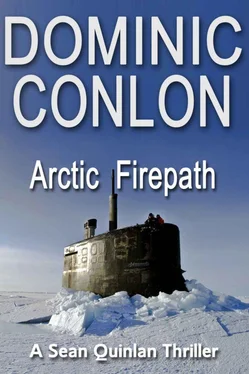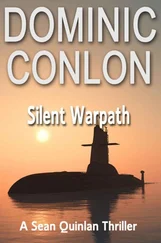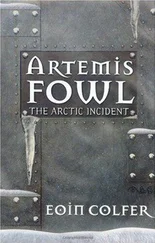* * *
‘Het.’ Feliks shook his head.
Major Pierce inclined his chin to one of the SEAL team. The man took a step forward, un-holstered his assault rifle and pointed it at Feliks. Before Feliks could say anything, he fired. The shot pinged off the steel bulkhead of the cabin, missing him by inches.
‘We have two nuclear specialists here. We don’t need you, but we don’t want to cause any unnecessary deaths. Work with us Feliks, or we will put you over the side.’ The voice was delivered in such a bored matter-of-fact tone; Feliks knew he was telling the truth. His shoulders slumped; knowledge of the boat’s reactors was no longer a bargaining counter. There was no way out of the situation. For now he would have to do what they asked.
‘We need enough power to traverse to this location.’ Major Pierce slapped a chart down on the table and indicated a position with the tip of a pen. To drive home the point, he circled the area. ‘Here, within 20 metres.’ Pierce wrote out the exact coordinates next to the circle. ‘Do what you have to do.’
Feliks started towards the door, intending to make a start. A brawny SEAL stepped into his path, blocking the way.
‘Oh I forgot,’ continued Pierce in his flat voice. ‘The nuclear engineers will be with you at all times, backed up with Chris here. He has instructions to kill you if the experts do not agree with any actions you make. You have five minutes from now to start engines.’
A thousand thoughts whirled through Feliks’ head. Five minutes! It would take longer than that just to bring the core up to an operating temperature. The thought of that filled him with dread; they had no idea of the consequences!
They escorted him to the reactor hall and he talked to the American engineers. He told them about the previous problems they had had, the snags during sea trials, and the subsequent corrosion issues in the primary circuit. The two moved away to discuss the difficulties without being overheard. Feliks could see them arguing, while the burly SEAL called Chris looked on uneasily. After a long period of heated discussion they returned.
‘We’re going to ask for some expert assistance to be drafted in. In the meantime you should begin a scheduled start.’
* * *
Captain Grigori looked around his room for a means of escape. The Americans had confined him to his cabin after the take-over of his ship. He tried the door, but it was locked from the outside. His internal phone had been ripped out and his mobile removed — not that he would ever get a signal at this latitude.
Grigori sighed and made straight for the drinks cabinet. He opened the door and counted the bottles, wondering if the Americans had taken any when they searched his cabin. When he was younger he used to drink heavily, but as his career took off he drank less and less. He began to realise he needed to maintain a clear head to make progress. But the funeral of his ex-wife and the detention of his son triggered a profound switch back to the bottle. He was ashamed of his increasing need for vodka.
All bottles were present and correct. Tentatively he reached in and unscrewed the top of one, savouring the moment before the first sip. The choice was stark; he could accept his ship was in the grip of the enemy and carry on drinking, or he could do something about it. He took one more swig, then deliberately screwed the cover on.
No-one knew LK-80 better than himself. For months he had supervised the construction in the yards, yelling at the welders when they produced sub-standard work, forcing them to go back and do the job properly. He had scrutinised every stage of the building of the keel and superstructure against the plans. The only area where he lacked detailed knowledge was in the design and integration of the ship’s nuclear reactors. He understood the basic principles, but the actual processes of fission were beyond his comprehension. Everything that flowed from that — from the tolerances required to machine the parts to the safety and backup systems — he relied on the expertise of Feliks and his team of engineers.
When the primary reactor had started to give problems during sea trials, he looked to Feliks to provide him with answers. And when he failed to resolve the issues quickly, Grigori metaphorically shrugged his shoulders. If Feliks couldn’t fix the teething problems, then no one else could.
But when it came to the construction of the rest of the ship, Grigori was proud of his knowledge. He headed to the toilet in his cabin — a luxury. His fellow officers had to make do with communal lavatories. But because of the budget the small room was not provided with an electric extractor system. Instead, the square window over the toilet was hinged along the top to supply natural ventilation.
Grigori rarely opened the porthole because the cold air was less welcome than any lingering odour. As he checked the casement lock, he felt rather than heard the rumble of the ship’s engines. They were moving, even though Feliks had expressly forbidden it!
With a new sense of urgency, he swung the porthole out on its hinge. It opened just enough for him to crawl out. He returned to the cabin and strode to the wardrobe. Scratching his head, he inspected the contents. A suit and white shirt for the odd formal occasion hung on a hanger, along with a couple of sweat tops and some jeans. Underwear, thermal socks and a knitted bobble hat lay on a shelf. Some old gloves were tucked away in a drawer. He picked out a pair of patterned socks and turned them over. They were a present from his deceased ex-wife two Christmases ago.
They would have to do. He stuffed the clothes into a holdall, knowing that if he were to put them on inside the cabin he would be unable to squeeze through the porthole. He found his flashlight in the tiny bathroom and paused one more time opposite the sideboard containing the vodka. Reaching in, he grabbed a bottle and put it into the bag. As he returned to the toilet, a plan was beginning to form.
* * *
Grigori clicked on his flashlight. The beam travelled over the steel walls of the cupboard which was no more than three feet wide by six foot long. Though tall enough to stand up, Grigori sat on top of an overturned mop bucket. He took a sip of vodka from the bottle. It was cold despite the extra clothes he had put on from his bag. For now this equipment locker on Bridge Deck 2 would have to do.
He needed to get to the radio room on Bridge Deck 4, aft of the bridge on the starboard side. The only approach was through the bridge which would be manned by American soldiers. There were two entrances to the bridge, one from each side of the ship. He had to think of a way to distract their attention for five minutes, so he could get off a message.
He surveyed the locker in the flickering light from his flashlight. A collection of brooms leaned against a corner. Some old discarded fire hose lay in another, weighing down a pile of hessian sacks.
Grigori took a second swig and started to screw the top back on. He paused and checked the label. Eighty percent proof. The plan might work, but it would mean having to part with the vodka. He clicked the flashlight off and shrugged in the dark.
As he opened the door to look out, a gust grabbed it and tried to wrench it from his grip. Grigori wedged it against his foot. The deck appeared to be deserted. He eased through, holding on to the jamb with both hands. Immediately he heard what sounded like a rivet gun coming from the stern.
With his back to the cabins, he worked his way up to Bridge Deck 3 without being seen by anyone. Grigori thought that most of the crew would have been herded into one of the larger salons below deck where they could be guarded by just a few soldiers.
Читать дальше












